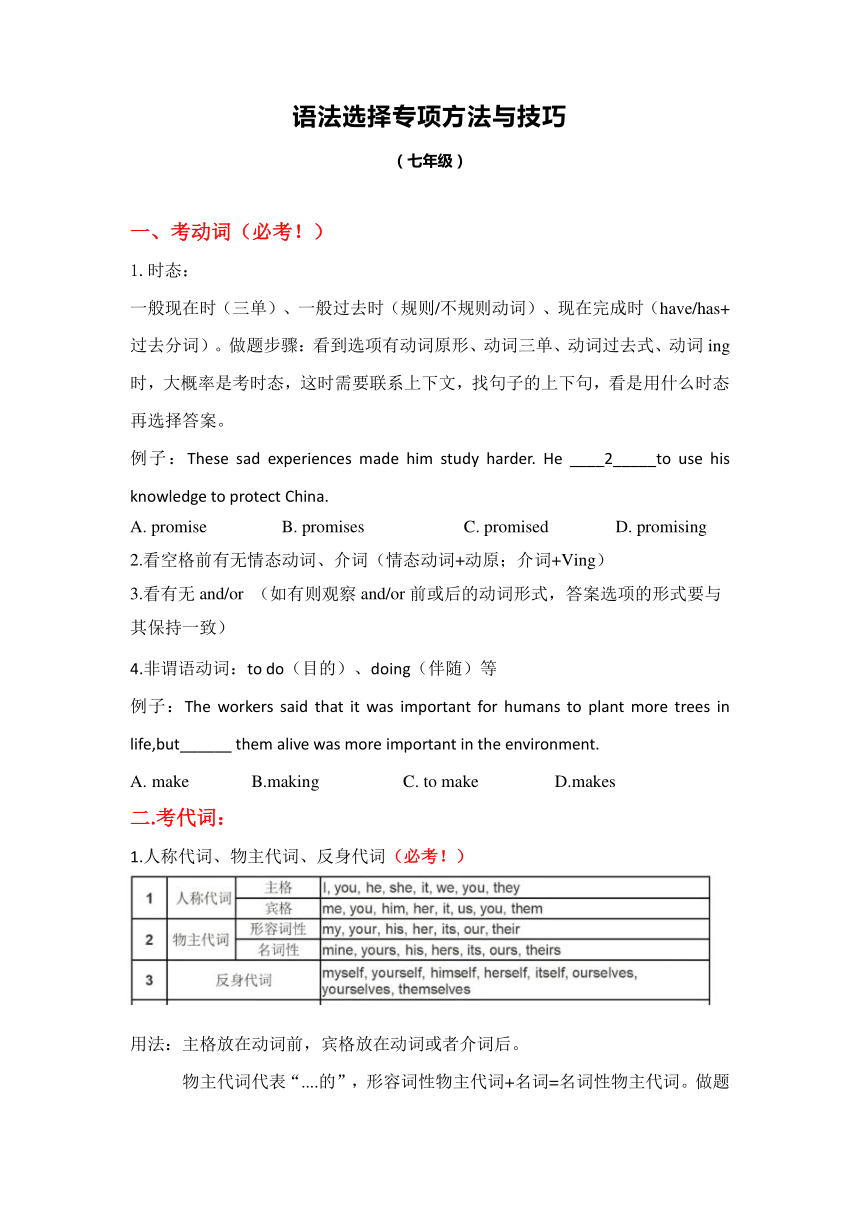
语法选择专项方法与技巧 (七年级) 一、考动词(必考!) 1.时态: 一般现在时(三单)、一般过去时(规则/不规则动词)、现在完成时(have/has+ 过去分词)。做题步骤:看到选项有动词原形、动词三单、动词过去式、动词ing时,大概率是考时态,这时需要联系上下文,找句子的上下句,看是用什么时态再选择答案。 例子:These sad experiences made him study harder. He ____2_____to use his knowledge to protect China. A. promise B. promises C. promised D. promising 2.看空格前有无情态动词、介词(情态动词+动原;介词+Ving) 3.看有无and/or (如有则观察and/or前或后的动词形式,答案选项的形式要与其保持一致) 4.非谓语动词:to do(目的)、doing(伴随)等 例子:The workers said that it was important for humans to plant more trees in life,but_____ them alive was more important in the environment. make B.making C. to make D.makes 二.考代词: 1.人称代词、物主代词、反身代词(必考!) 用法:主格放在动词前,宾格放在动词或者介词后。 物主代词代表“....的”,形容词性物主代词+名词=名词性物主代词。做题时看需要选择的空有没有名词在后面。 反身代词为“....自己”,通常前面有介词by,或反身代词常考———enjoy oneself / help yourself / dress oneself / teach oneself。 例子:Today, Huang’s story teaches us to work hard, face difficulties bravely, and love ____14___ country. we B. our C. ours D. ourselves 2.指示代词this、that、these、those:this是近的一个,that是远的一个,these是近的两个或以上,those是远的两个或以上 3.疑问代词who、whom、whose、which、what、whoever、whichever、whatever、how:通常需要根据句意去选择(常考!) 4.不定代词: some与any:some多用于肯定句,any多用于疑问句和否定句 each和every:every强调全体的概念(指三个或以上),each强调个体概念(指两个或两个以上) other、others、another、the other(常考!):other和others都是“其他的”,other+名词=others;another和the other都是“另一个”,但是another是指三个或以上的另一个,the other是两个的中的另一个,所以在题目中需要找出总的有多少个。例题: The team faced many problems. Designing a nuclear reactor was especially hard. They could not ask foreign experts for help so they used simple tools like abacuses and rulers. They did thousands of experiments. ____11_____ big challenge was making the submarine stable underwater. After many tests, they finally solved these problems. Other B. Another C. Others D. The other 5.a few、a little、few、little、many、much、a lot of/lots of(常考!): a few 和a little是“有一点”,few和little是“几乎没有”,有few的都是修饰可数名词的,little都是修饰不可数名词的。 many、much、a lot of/lots of都代表许多,但是many只修饰可数名词,much只修饰不可数名词,a lot of/lots of即可修饰不可数名词也可以修饰可数名词。例子: The team faced ___8_____ problems.Designing a nuclear reactor was especially hard. few B. little C. much D. many all、both、neither、either 三.考形容词(必考!): 形容词修饰名词,副词修饰动词。形容词的比较级和最高级的构成一般是在后面加-er和-est,多音节和一些双音节词前加more和most。比较级一般和than连用,最高级一般前面有the,the youngest。 做题方法:一般需要理解句意,看是形容名词的还是动词的,还是两个或三者比较。例 ... ...
~~ 您好,已阅读到文档的结尾了 ~~